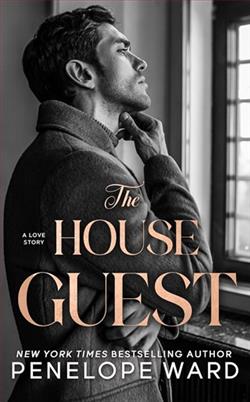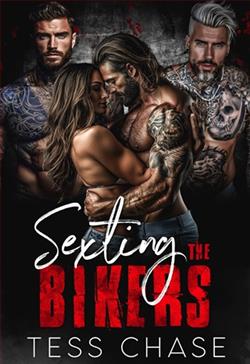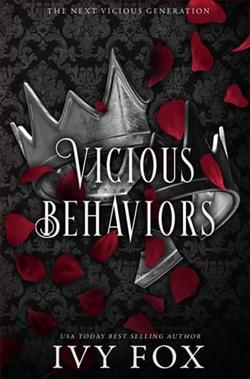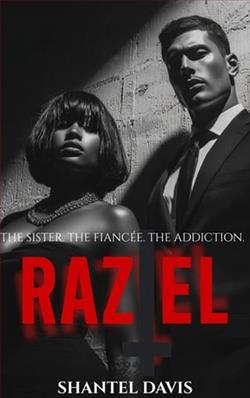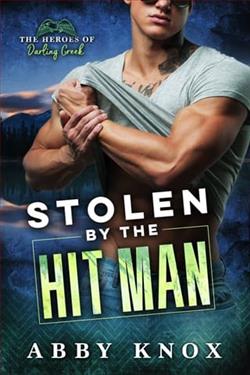Page 25 of The Lovers
Quinn heaped the gnocchi into a large bowl, decorated the dish with a few strategically placed leaves of basil, and set it on the table. “Voilà, dinner is served.”
“Great. I’ve been saving myself all day,” Gabe said with a smile. “I always enjoy your cooking.”
“And I always forget how much I enjoy cooking. It’s no fun cooking for one person,” Quinn added as she took a piece of crust and dipped it into the oil before popping it into her mouth.
“Have you learned anything?” Gabe asked carefully as he helped himself to Caesar salad.
“I have,” Quinn replied thoughtfully, “but it’s not exactly something I can share with the tenacious Mr. Morgan. I can hardly tell him the truth.”
“Have you met him?” Gabe asked, surprised by her response. It seemed that Rhys hadn’t told Gabe of their meeting.
“Yes,” Quinn replied without going into the details of their encounter.
“Just tell him what you know,” Gabe suggested as he tucked into the food with relish.
“I know quite a bit, Gabe, but I can’t support any of it with scientific fact, and Rhys Morgan doesn’t strike me as someone who would just accept what I say without proof.”
“Morgan leaves nothing to chance. That’s why he’s so good at what he does. Can you share with me what you’ve learned?” Gabe asked. Quinn knew he was curious, but for somereason, she was reluctant to tell him about Elise. Something about the girl’s peculiar situation and her frustration and loneliness made Quinn feel as if she were betraying a confidence. She supposed it was ridiculous to feel this way about someone who was long dead, but she couldn’t bring herself to tell Gabe of Elise’s predicament.
“I’ll tell you everything once I know more,” she promised. “In the meantime, we have to figure out how to present my ideas to Morgan.”
“Have you got anything at all that we can share with him?”
“Our lovers lived during the mid-seventeenth century. At that time, Mayfair was sparsely populated, not yet being the desirable location it became in the eighteenth century. There were several grand homes belonging to noble families in the area. There must be some record of who lived at the address where the skeletons were found during the period in question. Once I establish a tangible connection between the victims and the family, I’ll have something to present to Morgan.”
Gabe leaned back in his chair as he surveyed Quinn. “But how will you explain the rest?”
“I haven’t figured that out yet, mostly because I still don’t know what happened. Oh, I do wish you’d kept me out of this, Gabe. Rhys Morgan is not going to accept some theory without proof. He’s too much the consummate professional to just wing it, no matter how intriguing it might sound.”
“Let me help,” Gabe offered. “If you give me the name of the family, I might be able to dig something up.”
“The house belonged to Lord Edward Asher, but I really haven’t looked into him yet. I haven’t had the chance.”
“Asher? Really?”
“Have you heard of him?” Quinn asked with interest. She’d studied seventeenth-century history, but it wasn’t really her area of expertise.
“The name is familiar. I’m fairly certain that he served on the Privy Council and was a great favorite of Charles II, but I must double-check my facts.”
“Yes, he was a favorite,” Quinn answered dryly. It wasn’t until that moment that she realized how much she despised the man. He’d been gone for hundreds of years, but the residue of his persona now lived in Quinn’s mind.
“I take it he’s not one of the good guys,” Gabe remarked as he noticed the look of distaste on Quinn’s face.
“No, he’s not,” Quinn replied with disgust. “The man is reprehensible.”
“And long dead,” Gabe pointed out, a smile playing about his mouth.
“Not to me. You see, Gabe, that’s the problem with delving into the lives of these people.” Quinn sighed. “I can’t help getting involved. I know they died hundreds of years ago, and their problems died with them, but for as long as I’m investigating them, they are as real as you and I. They are living, breathing people who are trying to make the best of their lot in life. I don’t only see their actions but hear their thoughts and feel their anguish, and I suffer alongside them whether I want to or not. See, it’s not like reading a book or watching a film, where the immediate goal of the story is to entertain. I know that these people were real, and what they went through mattered.”
“Did you feel that way with your Roman soldier?”
“Perhaps not as much. Atticus had enjoyed a fairly good life until he was cut down in battle. He made an educated choice when he joined the army. He wished to see something of the worldand maybe cloak himself in glory while he was at it. He could have stayed at home and farmed the land alongside his father. Atticus would have lived to a ripe old age and raised a family of his own, unless some illness struck him down. Instead, he died when he was hardly more than a boy, but that was a risk he’d been prepared to take.”
“So, how is this different?” Gabe persisted as he twirled the stem of the wine glass thoughtfully in his hand.
“Life has never been as straightforward for women. A young girl was at the mercy of her father until she became the chattel of her husband. Some women got luckier than others, or perhaps they were more cunning and understood how to manipulate the circumstances to their benefit, but some girls were thrust into unexpected situations where there was nothing they could do but find a way to survive.”
“And this one clearly didn’t.”









